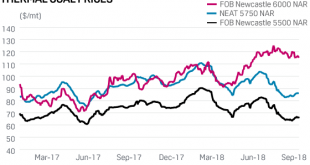In my recent piece in The Guardian, mostly about Adani, I observed The paradoxes of Adani are mirrored in the global coal market. Despite a small increase in 2017, global coal production is below its 2013 peak. Yet prices have recovered strongly, yielding big profits to existing miners and offering a seemingly tempting prospect for new mines. It turns out that this isn’t quite right. The benchmark Newcastle price, for low-ash coal with a heat content of 6000kcal/kg has risen strongly,...
Read More »Cheap tricks with economic statistics: the democratic version
from Dean Baker We all know Donald Trump’s tendency to make up numbers to tell everyone what a great job he is doing as president. People are rightly appalled, both that Trump is not doing a great job, but also that he is lying to imply otherwise. While Trump is clearly over the top in just inventing data to back his argument, Democrats are also often not very straightforward in assessing the data. We got a dose of that last week when there were complaints that the rate of income...
Read More »real-world economics review – issue no. 85
real-world economics reviewPlease click here to support this open-access journal and the WEA back issues18 September 2018issue no. 85download whole issue Globalization checkmated?Thomas Palley download pdf Post-crisis, next crisis Capital and class: Inequality after the crashDavid Ruccio and Jamie Morgan download pdf Post-crisis perspective: sorting out money and credit and why they matter!John M. Balder download pdf With their back to the future, will past...
Read More »Open thread Sept. 21, 2018
The best way to remove corruption in medicine: take the money out
from Dean Baker Former New England Journal of Medicine editor Marcia Angell had an op-ed in the NYT explaining how efforts to increase transparency had not ended the corrupting influence of money on medical research. Her piece describes various ways in which the researchers who get money from drug companies bend research to favor their benefactors. While Dr. Angell suggests some reforms, there is an obvious one that is overlooked: take the money out. Drug companies have incentives to bend...
Read More »Kant’s blunder
from Asad Zaman What is a model? How does it relate to reality? This question has been discussed thoroughly in previous post on Models and Reality , and briefly in previous lectures. Western understanding of models was derailed by a complex set of historical accidents. This is a tangled tale with bewildering twists and turns, some aspects of which are discussed in “Deification of Science and Its Disastrous Consequence“, and some others in Logical Positivism and Islamic Economics . The...
Read More »The bank bailout of 2008 was unnecessary
from Dean Baker Last week marked 10 years since the harrowing descent into the financial crisis — when the huge investment bank Lehman Bros. went into bankruptcy, with the country’s largest insurer, AIG, about to follow. No one was sure which financial institution might be next to fall. The banking system started to freeze up. Banks typically extend short-term credit to one another for a few hundredths of a percentage point more than the cost of borrowing from the federal government. This...
Read More »Open thread Sept. 18, 2018
Minskyan reflections on the ides of September
from Jan Kregel source The 10th anniversary of the September collapse of the US financial system has led to a number of commentaries on the causes of the Lehman bankruptcy and cures for its aftermath. Most tend to focus on identifying the proximate causes of the crisis in an attempt to assess the adequacy of the regulations put in place after the crisis to prevent a repetition. It is interesting that while Hyman Minsky’s work became a touchstone of attempts to analyze the crisis as...
Read More »Tony Lawson vs Uskali Mäki
from Lars Syll We are all realists and we all — Mäki, Cartwright, and I — self-consciously present ourselves as such. The most obvious research-guiding commonality, perhaps, is that we do all look at the ontological presuppositions of economics or economists. Where we part company, I believe, is that I want to go much further. I guess I would see their work as primarily analytical and my own as more critically constructive or dialectical. My goal is less the clarification of what...
Read More » Heterodox
Heterodox


